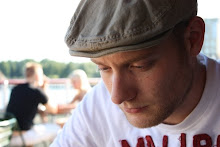
With around six months to go until a British general election, the campaigns are fast approaching. It's been almost five years since the last one and I think it is fair to say that a lot has changed since then. Back in 2005, Twitter wasn't even a glint in its founders' eye and YouTube was a place to watch funny videos of people falling off skateboards. Oh how times have changed, as Barack, Hillary, John and Sarah will undoubtedly tell you.....
During the US election those candidates bore the full force of a modern political campaign in an internet savvy, social networking, YouTube posting world. Can Gordon and Dave cope? What kind of election should they expect? How should we (and they) use new technologies to our advantage?
Here's my two cents......
Candidates:
It's really quite simple. Watch everything you do because everyone will be watching you. Watch everything you say because someone will be listening. Engage with the voters through all the means possible, and occasionally do it yourself rather than your designated social media people. We can tell if you are the one tweeting! Be creative, yes Gordon and Dave it looks good to have a photo of you paying your respects at a Remembrance Day service, but you don't need an official photographer there to get you into trouble. A quick snap from a passerby that "just happens" to make it online and the job is done.
Political Journalists:
Blog but you need to be consistent to build a regular following. Ensure you have structure to separate yourself from occasional bloggers and those just trying to say something for the sake of it. There are far too many blogs nowadays and those reporters with the insight and expertise to really provide cracking election commentary need to be heard. Blog readers will turn to you because you are supposedly the ones that can provide expert analysis. Entice them to your work and keep them by giving them what you do best. Monitoring Twitter is just as important as tweeting. Promote your blogs using tweets - work everything together. Finally, build some excellent and reliable social networking contacts. You can't be across everything all the time and if you use social networking intelligently you will find people more than willing to help you have eyes in many places.
Campaign teams:
Too much criticism has come out of recent elections that campaign teams have controlled too much of what the news media have access to. As much as I might not like the idea of things being so strictly controlled it does sometimes help journalists with access. However, it also gives an incentive for journalists to try and break through that barrier. A journalist will strive for an original story and in an election process and they will do everything they can to get it. Campaign staffers might not like it but it is the job of a journalist and the duty to the country's citizens to make sure that every story is told. On a more practical side of things campaign teams should be tweeting events and allowing interaction with their candidates and the voters. Twitter and social networking has broken down a lot of barriers in terms of access. I think if voters feel that their access is restricted, the outcome can only be negative. Because of a forward thinking campaign team, the Obama administration and DNC have an amazing amount of email addresses that they can continue to use. An intelligent campaigner in the UK would find a way to start collecting direct contact information for voters, despite the actual date of an election remaining unknown at this time.
Voters:
I think the golden rule of the next general campaign for any voter will be "don’t take their word for it." And you shouldn't have to. It is my belief that a voter is a lot more empowered than ever before. The information and access you have now is unprecedented. Don't waste it. If you are an undecided voter or willing to be a little open minded then you will have more chances to get the information you want. However, it is still important to consider the bigger picture if you are doing independent research. Don’t just follow Dave on Twitter, follow Gordon, follow Nick as well, follow the Greens. Following the BNP or UKIP does not mean you support them but it does mean you will get what they say straight from the horse’s mouth rather than someone else's interpretation. Following someone on Twitter does not mean you are politically aligned to them but it does mean you have an interest in the political landscape as a whole. Watch television and video news online and read the national and local papers because you'll get a balance of stories on the major parties. However, you should also read the blogs because although impartiality is great, sometimes opinion is great too. Look at who writes the blog, work out their agenda, read an opposing blog. Finally, monitor YouTube for the latest campaign and amateur videos.
All of these give you power but of course, all this is irrelevant if you don't actually vote.
PICTURE: www.lumaxart.com


No comments:
Post a Comment